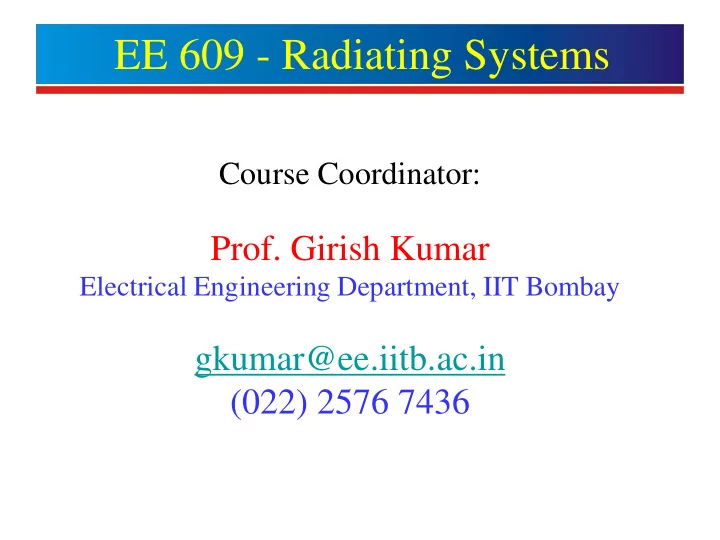

EE 609 - Radiating Systems Course Coordinator: Prof. Girish Kumar Electrical Engineering Department, IIT Bombay gkumar@ee.iitb.ac.in (022) 2576 7436
EE 609 Course Outline Introduction to Antennas Dipole, Monopole, Loop and Slot Antennas Linear and Planar Arrays Microstrip Antennas Helical Antennas Horn Antennas Reflector Antennas Yagi-Uda and Log-Periodic Antennas
EE 609 - Reference Books 1. C.A. Balanis, Antenna Theory – Analysis and Design , John Wiley, 2005 2. J.D. Kraus and R.J. Marhefka, Antennas , McGraw Hill, 2003 3. G. Kumar and K.P. Ray, Broadband Microstrip Antennas , Artech House, 2003 4. J.R. James and P.S. Hall, Handbook of Microstrip Antennas , Peter Peregrinus, 1989 5. W.L. Stutzman and G.A. Thiele, Antenna Theory and Design , John Wiley, 2012 6. R.C. Johnson, Antenna Engineering Handbook , McGraw Hill,1993
Antennas in Wireless Communication Systems Transmitter Modulating Signal Impedance Modulator Amplifier Matching Network Carrier Signal Receiver IF Filter Display Demodu RF and Mixer device/ lator Amplifier Amplifier speaker LO
Antennas for Various Applications MW Radio – Frequency: 530 to 1620 kHz (use λ /4 monopole antenna) Cell Phones – CDMA, GSM900, GSM1800, 3G, 4G, Wi-Fi/Bluetooth (use monopole, normal mode helical, microstrip antenna, etc.) Cell Towers (use monopole, dipole, microstrip antenna arrays, etc.) Satellite and Defense Communications (use microstrip, horn, spiral, helical, reflector, Yagi- Uda, log-periodic antennas, etc.)
Antenna Radiation Pattern z Radiation Pattern: Major Lobe (HPBW) Isotropic (FNBW) Omni-directional Directional Polarization: Minor Lobes Side Lobe Linear (H or V) Elliptical y Circular Back Lobe x
Antenna Fundamentals Directivity of the Antenna 41253 = 4 π A / λ 2 Gain = η D D E H Reflection Coefficient and VSWR Z Z 0 A Z Z Bandwidth of Antenna: A 0 Frequency range over 1 which VSWR < 2 V max VSWR V 1 min
Link Budget Transmitting antenna Receiving antenna r A et A er Receiver Transmitter Friis Transmission Equation 2 P P G G Watt r t t r 4 r
Dipole Antennas Folded Broadband Dipole Antenna for RF Harvesting Radiation pattern of a dipole antenna Chip Microstrip line fed Dipole Antenna Dipole Antenna for RFID
Monopole Antennas Short monopole current h Quarter-wave monopole current Image currents Broadband triangular monopole antenna used for RF Harvesting from cell phone
Loop Antennas Small circular loop antenna multi-turn loop antenna equivalent to magnetic dipole [C.A. Balanis, Antenna Theory – Analysis and Design , John Wiley, 2005]
Slot Antennas Centre-fed Slot Antenna Off-centre-fed slot Antenna
Linear and Planar Antenna Arrays Linear Antenna Array Planar Antenna Array Amplitude and phase of each element, spacing between the elements, choice of element and feed network determine performance of array
Microstrip Antennas Y Microstrip Antennas (MSA): Different Shapes Broadband Top View Compact X W x Multi-band L Dual polarization Circular Polarization Side r Linear and Planar Arrays h View (series and parallel feeds) Ground Plane Co-axial Feed Rectangular Microstrip Antenna On Finite Ground Plane
Microstrip Antenna – VSWR Plot Bandwidth for VSWR < 2 is from 1.76 to 1.855 GHz (95 MHz) % BW = 5%
Microstrip Antenna – Radiation Pattern Radiation Pattern at 1.8 GHz Front to Back Ratio F/B = 15 dB
Microstrip Antenna Array 16 x 16 array with feed network at 35 GHz
Space Fed MSA Array Top View Side View Ground Plane
Helical Antennas NORMAL AXIAL CONICAL MODE MODE MODE C = π D << λ C = π D = λ C = π D = n λ
Pyramidal and Conical Horn Antennas Pyramidal Horn Antenna Microstrip Antenna Integrated with Conical Horn Antenna
Reflector Antennas Reflector Antennas: Planar Corner Parabolic Aperture Feed Higher gain but occupies large space
Yagi – Uda Antennas Directors Fed Dipole Reflector
Log-Periodic Antenna
CONCLUSIONS Antenna technology is rapidly changing. Requirement for innovative thinking to meet the challenges – broad-band, multi-band, compact, high efficiency, multi-polarization, MIMO, smart antennas, etc. Design is the most important thing. Requires precision manufacturing. Low cost without sacrifice in performance.
Recommend
More recommend